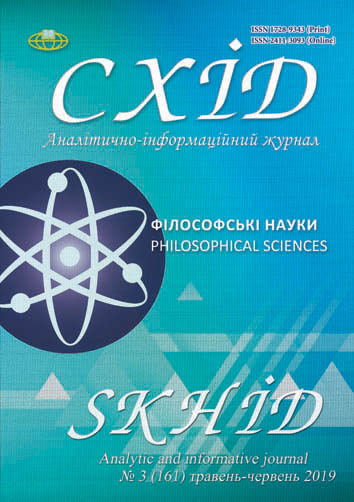Political agitation and state of mental maturity of the domestic society
DOI:
https://doi.org/10.21847/1728-9343.2019.3(161).171721Keywords:
elections of the President of Ukraine, electorate, rationality, logic, political mythmaking, mythologemeAbstract
In the article the author develops a typology of accents of the influence on the contemporary domestic electorate during the election of the President of Ukraine in the spring of 2019. This purpose is achieved by involving socio-philosophical methodology and the achievements of a psychoanalytic philosophical paradigm. There are four types of accents that were observed during the race. Politicians of the first accent sought to influence the critical thinking of the electorate. The second group of politicians sought to exploit a scientifically constructed myth - about themselves or “almost” about themselves. The third group focused on individual myths that were not united by a holistic political myth. The fourth group appealed to the trust that was unreasonable. Thus, political agitations form a continuum - from attempts to influence solely voter’s rationality to counting on the resonance of their subconscious mythological architectonics. In addition, it is concluded that the politicians of near future should flexibly involve all constructive from this continuum in order to strengthen their own positive influence on the electorate. In this context, the modern politicians should focus on political mythmaking necessarily, because it is scientifically correct. The author of the article shares the view of those classics of philosophy who see the basis of any cultural activity in myth. Of course, a rational component of political agitation should be present. For example, there should be very rationally compiled (and executed) political program.Downloads
References
Biletskyy, V. V. (2006). Formalna lohichnist politychnoyi rytoryky yak tekhnolohiya vplyvu na elektorat. In: Materials of the second scientific conference "Modern social problems in the measurement of sociology of management" (Donetsk, April 14, 2006). Donetsk: DonNUU: 192-195. (In Ukrainian)
Biletskyy, V. V. (2010). Aktualnist prykladnykh doslidzhen politychnoyi rytoryky. In: Materials of the Regional Scientific Conference "Philosophy in the Modern World". Donetsk: DonNU: 74-75. (In Ukrainian)
Ortega y Gasset, José (1994). Bunt mas (translat.) In: Vybrani tvory. Кyiv: Osnovy. (In Ukrainian)
Spencer, Herbert (1999). Opyty nauchnyye, politicheskiye i filosofskiye. Minsk: Sovremennyy literator, 1408 p. (In Russian)
Gramshi, Antonio (2005). Tyuremnyye tetradi (translat.). In three parts. Part 1. Moscow: Izdatelstvo politicheskoy literatury, 560 p. (In Russian)
Kara-Murza, S. (2005). Manipulyatsiya soznaniyem. Moscow: Eksmo, 832 p. (In Russian)
Eliade, Mircea (2000). Izbrannyye sochineniya. Mif o vechnom vozvrashchenii (translat.). Moscow: Ladomir. 414 p. (In Russian)
Eliade, Mircea (2010). Aspekty mifa (translat.). Moscow: Akademicheskiy proyekt, 256 p. (In Russian)
Yung, K. G. (1996a). Chelovek i yego simvoly (translat.). St. Petersburg: B. S. K., 451 p. (In Russian)
Yung, K. G. (1996b). Dusha i mif: shest arkhetipov (translat.). Кyiv: State Library of Ukraine for the Young, 384 p. (In Russian)
Campbell, J. (1997). Tysyachelikiy geroy (translat.). Moscow: Vakler, Refl-buk, AST, 384 pp. (In Russian)
Propp, V. (2001). Morfologiya volshebnoy skazki. Moscow: Labirynt, 114 p. (In Russian)
Dodonov, R. O. (ed.) (2017). Hibrydna viyna: in verbo et in praxi. Vinnytsya: TOV «Nilan- LTD», 412 p. (In Ukrainian)
Downloads
Published
How to Cite
Issue
Section
License
Copyright (c) 2019 Vitaliy Biletskyy

This work is licensed under a Creative Commons Attribution-NonCommercial-NoDerivatives 4.0 International License.
1. Authors bear responsibility for the accuracy of facts, quotations, numbers and names used.
2. Manuscripts are not sent back.
3. The publisher does not always agree with the authors' opinion.
4. The authors reserve the right to authorship of the work and pass the first publication right of this work to the journal under the terms of a Creative Commons Attribution-NonCommercial-NoDerivatives 4.0 International License. This license allows others to distribute (copy) the published work for non-commercial purposes, provided there is mandatory attribution to its authors and a link to the first publication in our journal.
5. The authors have the right to conclude separate supplement agreements that relate to non-exclusive work distribution in the form in which it has been published by the journal (for example, to upload the work to the online storage of the journal or publish it as part of a monograph), provided that the reference to the first publication of the work in this journal is included.

